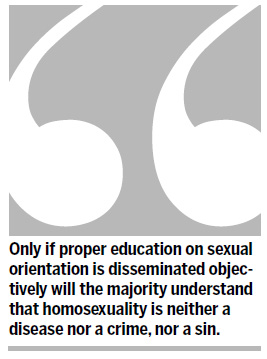Lin Hong
Discussion reflects social progress

Actress Lu Liping recently re-posted a self-proclaimed priest's anti-homosexual message on her micro blog, which says gays and lesbians are a "shameful" community of "sinners". Lu's attitude and her use of a "priest" to launch a tirade against homosexuals have outraged many people.
To some extent, social attitudes toward homosexuality mirror the development of gender equality and the level of harmonious diversification in a society. In a sense, it is related to a society's progress, too.
Since the end of the last century, the government has taken two major steps to remove the stigma attached to homosexuals: declaring that homosexuality is neither a criminal offense nor a mental disease. In 1997, the revised Criminal Law excluded homosexuality from the realm of hooliganism. And in 2001, homosexuality was removed from the list of Classification and Diagnostic Criteria of Mental Disorders.
But moral neutralization of sexual orientation has not made as much progress. The problem is that it cannot be done only by fixing or introducing policies. The hate or taboo factor can be eliminated only through sustained reform of sexual education. This is not to say that homosexuality should be promoted. Society needs understanding, not promotion.
Since a person's attitude toward something or some event reflects his/her state of mind, Lu's attitude prompts us to dig deeper into certain aspects.
First, many people hate homosexuals because they do not understand sexual orientation. In other words, prejudice and discrimination against homosexuals are rooted in ignorance. So only if proper education on sexual orientation is disseminated objectively will the majority understand that homosexuality is neither a disease nor a crime, nor a sin as Lu would make us believe.
Second, though the acceptance and tolerance level of people toward homosexuality has increased - netizens arguing against and condemning Lu prove this - many people still discriminate against and misunderstand homosexuals. Even today, few people will openly disclose that they are gays or lesbians, which indicates that social understanding and tolerance are still limited.
The controversy surrounding homosexuality has intensified because some people have launched personal attacks against Lu, which is wrong, because irrational criticism of neither Lu nor homosexuals will help promote understanding of diverse sexual orientation.
Third, the rate of social concerns and arguments on the issue reflects the freedom of speech Chinese people enjoy and the openness of society. It also shows that Chinese people are open to debates on the subject.
In short, the debate on homosexuality, considered a taboo even a couple of decades ago, indicates the progress Chinese society has made.
The author is an associate professor at the Department of Anthropology & Ethnology, Xiamen University.